When Anne Stewart, a partner at Blake, Cassels & Graydon LLP, started thinking about retirement after a four-decades-long career in corporate law, her biggest concern was how to channel the energy and passion that had driven her to the top of her field.
“I loved what I did and I can tell you honestly that I can’t remember ever having a dull day. … Every day my career challenged me intellectually,” says Stewart, who retired at the end of 2016. “Many of my clients are those who have been with me since 1975 and they have become my good friends. The thought of retiring not only worried me, it scared me.”
With no children or family close by, the idea of not having somewhere to go every day was frightening to say the least. It was important for Stewart to fill her days with something meaningful.
“I was so focused on my job and, like many of my friends in senior roles, we delayed thinking about change,” adds the 65-year-old. “I knew that when that day [retirement] came, I wanted to continue to be useful to society.”
Stewart knew she wasn’t the only professional woman struggling with questions such as: “How am I going to fill my days? How can I still make a difference in the world? What else is there out there for me?”
After speaking to several colleagues, Stewart saw a need for a forum where like-minded women could get together to discuss this “third chapter” in life.
As a longtime supporter of the Minerva Foundation, a non-profit organization dedicated to fostering leadership in girls and women throughout the province, Stewart approached the foundation about creating a program to help women navigate retirement – one that included peer support and concentrated on offering inspiration and hope.
“Many of my friends also worried about health and financial issues, where were they going to live as they age, who will they be at 80, and so on,” adds Stewart.
Countless women grapple to find a meaningful role in the later years of life, says Jen Murtagh, CEO of the Minerva Foundation.
“This period of transition can be really difficult for incredibly educated, high-profile women. Many may feel fear, anxiety, grief and even depression,” she explains. “They feel a void, a vacuum of sorts. Through our program, they discover that they can still stay relevant and connected while enjoying their third act.”
Leaders in Transition was launched in 2014 as a pilot program for women aged 55 to 65. The first two cohorts were so successful that the Minerva Foundation launched a third one in January 2017.
“This is a six-month comprehensive program and the group meets one day each month for about six hours,” she adds. “We have facilitators focused on different topics each month. … It can include discussions about finances, health, fitness, leisure and relationships. This is a very interactive program that encourages women to share their thoughts with the other women in the cohort.”
Joanne Gassman, who took part in the first cohort, says the program helped her envision her future. As a senior vice-president at the Bank of Montreal – a job she was passionate about – she too postponed thinking about the “R” word.
“However, around 55 I began growing tired of travelling to Toronto twice each month on business,” says the 59-year-old, who retired in 2015 to Bowen Island with her partner of 30 years.
When a friend told her about Leaders in Transition, Gassman was intrigued.
“I thought it would be a great opportunity to meet some amazing women who were also facing their next chapter in life,” she explains. “The program was very helpful. I realized that I was grieving a loss, a loss of a career that defined me, and that I had to move through the grief. It was at times very emotional, yet it was an empowering and bonding experience.”
Gassman says Leaders in Transition also forced her to take the time to think about herself.
“It’s not about giving you the answers; rather, it’s about you taking the time to reflect on what your retirement will look like,” says Gassman, who has since become involved in several non-profit organizations that help the homeless and others that empower young girls.
“The course was great. It really helped make the next chapter of my life more fulfilling.”
Perhaps one of the greatest benefits of the program, say all three, are the many new friendships forged.
“It’s been great. Women tell us that they have stayed connected and many organize reunion events on a regular basis,” says Murtagh.




